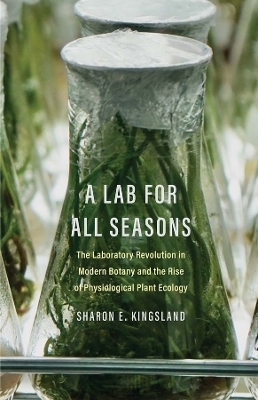
A Lab for All Seasons
The Laboratory Revolution in Modern Botany and the Rise of Physiological Plant Ecology
Seiten
2023
Yale University Press (Verlag)
978-0-300-26721-1 (ISBN)
Yale University Press (Verlag)
978-0-300-26721-1 (ISBN)
The first book to chronicle how innovation in laboratory designs for botanical research energized the emergence of physiological plant ecology as a vibrant subdiscipline
Laboratory innovation since the mid-twentieth century has powered advances in the study of plant adaptation, evolution, and ecosystem function. The phytotron, an integrated complex of controlled-environment greenhouse and laboratory spaces, invented by Frits W. Went in the 1950s, set off a worldwide laboratory movement and transformed the plant sciences. Sharon Kingsland explores this revolution through a comparative study of work in the United States, France, Australia, Israel, the USSR, and Hungary.
These advances in botanical research energized physiological plant ecology. Case studies explore the development of phytotron spinoffs such as mobile laboratories, rhizotrons, and ecotrons. Scientific problems include the significance of plant emissions of volatile organic compounds, symbiosis between plants and soil fungi, and the discovery of new pathways for photosynthesis as an adaptation to hot, dry climates. The advancement of knowledge through synthesis is a running theme: linking disciplines, combining laboratory and field research, and moving across ecological scales from leaf to ecosystem. The book also charts the history of modern scientific responses to the emerging crisis of food insecurity in the era of global warming.
Laboratory innovation since the mid-twentieth century has powered advances in the study of plant adaptation, evolution, and ecosystem function. The phytotron, an integrated complex of controlled-environment greenhouse and laboratory spaces, invented by Frits W. Went in the 1950s, set off a worldwide laboratory movement and transformed the plant sciences. Sharon Kingsland explores this revolution through a comparative study of work in the United States, France, Australia, Israel, the USSR, and Hungary.
These advances in botanical research energized physiological plant ecology. Case studies explore the development of phytotron spinoffs such as mobile laboratories, rhizotrons, and ecotrons. Scientific problems include the significance of plant emissions of volatile organic compounds, symbiosis between plants and soil fungi, and the discovery of new pathways for photosynthesis as an adaptation to hot, dry climates. The advancement of knowledge through synthesis is a running theme: linking disciplines, combining laboratory and field research, and moving across ecological scales from leaf to ecosystem. The book also charts the history of modern scientific responses to the emerging crisis of food insecurity in the era of global warming.
Sharon Kingsland is professor emerita in the Department of History of Science and Technology at Johns Hopkins University. She is the author of two previous books and has coedited two essay collections. She lives in Baltimore, MD.
| Erscheinungsdatum | 05.09.2023 |
|---|---|
| Zusatzinfo | 11 b-w illus. |
| Sprache | englisch |
| Maße | 156 x 235 mm |
| Themenwelt | Naturwissenschaften ► Biologie ► Botanik |
| Naturwissenschaften ► Biologie ► Ökologie / Naturschutz | |
| ISBN-10 | 0-300-26721-5 / 0300267215 |
| ISBN-13 | 978-0-300-26721-1 / 9780300267211 |
| Zustand | Neuware |
| Informationen gemäß Produktsicherheitsverordnung (GPSR) | |
| Haben Sie eine Frage zum Produkt? |
Mehr entdecken
aus dem Bereich
aus dem Bereich
Gefäßpflanzen: Grundband
Buch | Hardcover (2021)
Springer Spektrum (Verlag)
44,99 €
Diversität, Morphologie, Ökologie und Evolution der Pilze
Buch | Softcover (2023)
Springer (Verlag)
49,99 €


